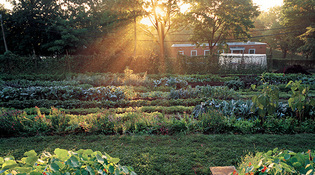 loading
loading
featuresMeanwhile, back on the farmYale’s one-acre student-run farm sells vegetables at farmer’s markets—and teaches sustainability.  Jake WymanFarming at Yale is small-scale but alive and well. On about an acre at the north end of campus, the Yale Farm is home to more than 100 plant varieties. View full imageIt spans only about an acre at the north end of campus, but the Yale Farm brings a world of food experiences, issues, and ideas to the Yale community. Student interns and volunteers learn to grow vegetables, fruits, herbs, and flowers, care for honeybees and free-range hens, and manage soils for long-term health. Russian literature classes come to thresh Ukranika wheat, a variety much like a kind of wheat mentioned in Anna Karenina. Moreover, the farm serves as a forum for studying the complexity of food systems and thinking creatively about sustainability, affordability, fairness for workers, and the environment. “There’s a misconception that we’re training farmers. We’re training food-literate leaders”—farmers among them—says Mark Bomford, director of the Yale Sustainable Food Program (YSFP), which stewards the farm and, in 2012, started another on Yale’s West Campus. “We don’t want to teach students to use best practices in an already existing system. We want them to develop better systems. That’s our big plot to take over the world.” The farm took root in 2003 as part of a wide-ranging effort to raise Yale’s food consciousness, spearheaded by students and faculty, with the help of famed chef and food activist Alice Waters and then–Yale president Rick Levin ’74PhD. The Yale Sustainable Food Project (as it was originally known) organized conferences and brought the first sustainable food to Yale’s dining halls. When Yale Dining (now Yale Hospitality; see page 34) took over that effort under Rafi Taherian, the YSFP shifted to an academic focus. The plot of land on Edwards Street was once a garden on the estate of William Whitman Farnam, Class of 1866, which was donated to Yale in 1930. The garden lay largely forgotten until the YSFP transformed it into a year-round teaching farm. It’s now home to more than 100 different cultivars, including asparagus, corn, tomatoes, beets, turnips, anise, flax, and canola. “It grows a little bit of everything, because we want to teach a little bit of everything,” says Bomford, who also teaches a seminar on Approaches to Sustainable Food and Agriculture. Students sell crops from the farm at the Wooster Square farmers’ market every Saturday. (Spicy Mix—a mixture of seven mustard greens—is the perennial best seller.) Every Friday, using the farm’s wood-fired hearth oven, they make pizza that President Peter Salovey ’86PhD calls “one of the great things to eat on this campus.” Second-graders from New Haven public schools plant radish and lettuce seeds and return seven weeks later to harvest them for salads. Students from across the campus help care for the hens. “We call them our ‘chicken tenders,’” says Austin Bryniarski ’16. He works for the YSFP on a two-year Lazarus Fellowship in sustainable agriculture, funded by Shelly and George Lazarus ’67; they also finance paid internships for undergrads during the school year and summer, as well as a farm-centered freshman orientation. The farm serves as an outdoor classroom for a wide variety of Yale courses. An engineering class helped design its rodent-proof chicken feeder. A statistics class analyzed harvest and farmers’-market sales data. A class on Roman culture used the farm as a forum for discussing agricultural needs of empire building, and a seminar on beer in US history learned about hops. And yes: the farm does make a Yale Ale. But only for educational purposes.
The comment period has expired.
|
|